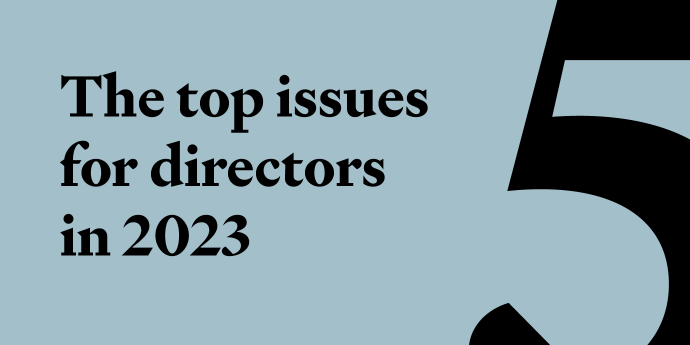
Top 5 issues for directors in 2023

Boards and directors are facing myriad challenges and many of these challenges will only increase in scale and importance.
Recognising many of the issues facing directors is not difficult; settling on a top five is. Climate change, for example, will obviously be at the top of the list, but just identifying risk is no longer acceptable. It is the measures you have in place and the changes you are making that are now expected of organisations.
There are so many factors shaping a to-do list, including global forces such as the Covid-19 pandemic still surging around the world; the ongoing and significant impact of climate change; the short and long-term implications of transformative technologies; and the ever-shifting and increasing consumer and community expectations.
This then leads into consideration of diversity and inclusion, and equity issues that are increasingly tied up with many organisation’s social licence to operate.
Our ‘Top 5’ does not aim to be comprehensive. It is instead a useful starting point for 2023 because it highlights areas that need immediate attention and action; and the issues boards should discuss during the year and how, and the reasons for having those discussions.
It is intended to help directors add value to their organisations by thinking ‘over the horizon’, anticipating developments and supporting management to be responsive to the changing operating environment.
This list gives directors and their boards a sense of where potential opportunities and future strategic challenges may arise. Considering these issues in 2023 will help to minimise surprises, support good decision-making and help boards and management prepare for the future (in ways that can be anticipated now).
It pools and interprets information from different sources, including our 2022 IoD/ ASB Director Sentiment Survey, and the monitoring of global trends and emerging governance issues.
For 2023, we have identified the ‘Top 5’ as:
1. Climate change transformation
Urgent action towards a low-emission economy, reporting progress and integrating decision-making
Why does it matter?
More than half of directors see climate change (along with water and resource management) as a critical future trend. In the 2022 Director Sentiment Survey, respondents ranked this second only to the related issue of customer expectations as a key trend requiring board attention.
New Zealand’s climate-related disclosures regime, which comes into force for banks and some large financial institutions in 2023, will tighten up and codify reporting requirements. This will help companies avoid “greenwashing” and indicate the direction of travel to the boards of organisations that are not currently affected by the regulatory requirements.
This focus is not going away and will strengthen over time. There will also be growing attention to the environment, specifically in relation to reporting and risk management. The global Taskforce on Nature Related Disclosures (TNFD) has released a beta reporting framework that looks at how to identify, assess, manage and disclose nature-related dependencies, impacts, risks and opportunities. The New Zealand External Reporting Board (XRB) also has a legislative mandate to develop non-mandatory sustainability reporting standards.
What should boards discuss?
The XRB climate-related disclosures standards signal the issues that boards should consider to support progress towards a low-emissions economy and climate resilient organisations, even if they are not necessarily subject to the mandatory climate-related disclosure requirements, including:
- Organisational strategy: How are decisions related to greenhouse gas emissions integrated with the wider strategy of your organisation? Where is there alignment and where is there inconsistency? Is change required to business models as a result of climate-related risks or reductions in emissions
- Climate-related risks: How will increasingly higher temperatures, sea level rises and more severe weather events impact on your organisation? How do you integrate these climate-related risks into your wider risk-management approach, including avoiding “greenwashing”? How effective is your current risk-management approach?
- Climate-related opportunities: What “upsides” might there be from a changing climate, including from your board’s and organisation’s responses? Can you create business or other opportunities while addressing the climate-related risks you have identified?
- Emissions levels now and into the future: For all organisations, what are your current and projected greenhouse gas emissions? What direct emissions reduction options are there? What will you do about the emissions you can’t reduce? Understanding your emissions profile, your “number”, current and projected, is critical to managing emissions. And for large company boards and financial institutions, what is your current and projected emissions “number”, including information about suppliers and customers? How are you developing relationships with major suppliers and customers to understand their greenhouse gas emissions?
What actions should boards take?
- Know your number: What is your organisation’s current greenhouse gas emission level and what are your future projections?
- Identify the biggest risk from more severe climatic conditions, and the mitigation/ management approach for it.
2. Shared value
From organisations to people; from profit to shared value; from “me” to “we”
Why does it matter?
He tangata, he tangata, he tangata (it is the people, it is the people, it is the people) is going to be a key focus. Sustainable value creation requires that the interests of your people and stakeholders are considered and addressed. The shared value approach aims to strengthen organisational sustainability and, ultimately, benefit society. Organisations that are perceived to be socially irresponsible can suffer acute losses in customer and stakeholder support, and in value.
In our 2022 Director Sentiment Survey, 55% of directors saw labour quality and capability as the most significant issue the economy and the country were facing.
The labour market is very tight. Levels of employment are the highest they have been in more than a decade. Similarly, unemployment levels at around 3% are the lowest in a generation. Tighter immigration settings seem set to persist for the foreseeable future, potentially affecting the supply of labour.
“Sharing value” with staff to retain them and to attract new people is vital. Boards can lead their organisations through strategy development and support for management that ensures value is shared by employees, and staff are treated well and seen as an asset, rather than a cost.
Lessons from past economic and societal shocks suggest there is value in retaining talent, as far as possible, even in the face of severe financial and economic downturns (e.g. the 2008 Global Financial Crisis and the pandemic).
More specifically, issues of authentic organisational purpose, fair pay, gender and other pay gaps, health and safety performance, workforce diversity and attention to modern slavery (in addition to other supply chain issues) loom large in a constrained labour market.
What should boards discuss
To ensure that shared value, including people and talent, are front of mind, ask:
- How up to date is your strategy in relation to the organisation’s social impact on stakeholders, including management and staff?
- Are you sufficiently clear about your organisational purpose, are you conveying this to management and staff, and is the organisation operating consistently with that purpose?
- Is your remuneration competitive and fair, including considering any pay gaps, notably with gender and ethnicity?
- What major changes in legislation (e.g. fair pay agreements) and other people-related developments should you be paying attention to and how should the board help management respond to these developments in a way that retains and attracts staff?
What actions should boards take?
- Collectively agree how your organisation approaches shared value – the concept of sharing the value delivered by an organisation (including profits) with management, employees and, potentially, suppliers to more fully recognise their contribution.
- Prepare a new people strategy that acknowledges the nature of the post-pandemic environment and more fully recognises employee contributions; makes an investment in talent; ensures diversity, equity and inclusion.
3. Financial resilience
Managing inflationary pressures, high interest rates and economic uncertainty
Why does it matter?
The world will be a volatile and uncertain place in 2023. Market disruptions are continuing locally and internationally, there is the prospect of a global recession, the outcome of the Russia-Ukraine conflict remains uncertain, major powers are retreating from international trade and there is ongoing volatility in foreign exchange markets.
These developments have the potential to tighten the government’s fiscal position. For not-for-profit organisations, this could impact funding streams from government, alongside uncertainty of funding from other sources, including philanthropy and community grant funders.
Only 18% of respondents in our 2022 Director Sentiment Survey expect New Zealand’s economic performance to improve over the next 12 months, while 68% expect it to decline. More than a third of directors expect global tensions, supply chain issues and labour shortages to have a notable impact on their organisation and almost half think these factors will “somewhat” impact their organisations.
Boards can help by ensuring their organisation have sufficient runway in the event of adverse developments. This may mean taking a conservative view and being prepared for shocks.
Balance sheets need to be strong in these circumstances. Specifically, higher cash holdings can help smooth the ups and downs in funding, and costs that may arise. The flexibility cash gives can also help financial sustainability over the medium term.
What should boards discuss?
- Clean up outstanding debtors.
- Look at ways to reduce significant inventory being held, taking into account the need for inventory to be held “just in case” (rather than “just in time”), given ongoing pressure on supply chains internationally.
- Review expenses and investments that are not essential for the delivery of the organisation’s services and goods. Company boards could also consider other sources of cash to further build financial resilience, including:
- Raising capital/funding from a range of sources, including key stakeholders.
- Reviewing and considering the extension of all existing banking facilities.
- Reviewing all operations aspects to test value and, as a result, selling any surplus assets.
Any consideration of reducing staff to shore up cash reserves needs considerable care and attention. In that context, “shared value” needs to be considered and experience suggests a long-term view is needed.
What actions should boards take?
- Agree levels of cash holdings that are sufficient to withstand shocks and significant volatility in funding, revenue, supply chains and exchange rates.
- Ask management to develop a value map of the value delivered to customers and those served by your organisation in the face of increasing costs.
4. Digital reality
Securing the cyber future now and into tomorrow
Why does it matter?
Boards need to lead their organisations to deal with short-term and ongoing cyber security threats. CERT New Zealand says there is no such thing as a “quiet time” for cyber security. Boards need to lead into the future and through organisational transformation, with changes also likely to the way the board operates.
Cyber security is a significant focus internationally, notably in the United States. The unstable international environment and growing threats from countries, and other players, means there are significant cyber threats in New Zealand. Despite this, in our 2022 Director Sentiment Survey, directors reported ongoing declines in their boards discussing cyber risk and being confident their organisation has the capacity to respond to a cyberattack or incident (54% in 2022, down from 60% in 2021).
Taking a longer-term view, New Zealand boards do not appear to be giving attention to digital developments, including artificial intelligence, the metaverse, cryptocurrencies and decentralised autonomous organisations.
Yet many of these digital developments are already with us and have the potential to have profound impacts. New Zealand boards are increasing their capability to help their organisations navigate this digital reality, but this is from a low base. Around 30% of directors in our 2017 Director Sentiment Survey said their boards had this capability, rising to 37% in the 2022 survey. Despite this, two-thirds of New Zealand directors in the 2022 survey believe there will be technological transformation of their board practices by 2030.
Many organisations have adopted virtual meetings options for boards and shareholder engagement. There is likely to be greater uptake of using interactive data to drive critical conversations, along with the use of virtual and augmented reality options for meetings. This will require boards to be agile and develop their digital capability to ensure governance practices keep up with broader technological trends.
What should boards discuss?
- The board’s understanding of the implications of digital and technology for the organisation, and the extent to which this is sufficient to provide valuable guidance to management.
- The potential for digital transformation to positively change the way the organisation operates and to create additional value for shareholders or members, deliver improved organisational financial performance and enhance the value for those the organisation serves.
- Where digital transformation is underway, are the measurements and information being provided to the board sufficient?
- The ways the board is thinking about the talent in the organisation to support digital transformation.
- The extent to which the board has a clear view of the short-, medium-, and long-term threats to digital systems and the wider organisational transformation.
What actions should boards take?
- Get quarterly briefings on cyber threats from the executive responsible for your organisation’s information and data security.
- Develop a limited number of digital transformation scenarios for the board’s and organisation’s operations.
5. Board agility
Lead with courage, develop trust and build dynamic capabilities
Why does it matter?
The pace of change and the uncertainty inherent in the other ‘Top 5’ issues means boards have to be increasingly agile, innovative and quick in their decision-making.
The responses to the pandemic forced this, to some degree, and many thought that permanent changes would occur in the ways boards operate. A 2021 international survey for the Global Network of Directors Institutes (GNDI) found 89% of directors had been able to effectively govern through the pandemic to that point and 34% were planning to alter their operating model.
In our 2022 Director Sentiment Survey, 40% of New Zealand directors believed board operations would change because of external pressures.
OliverWyman’s 2021 analysis of board agility points to four characteristics:
- They are ‘hybrid’, meaning they work in a digital environment and not all meetings are ‘face to face’. Changes in virtual and altered reality seem likely to reinforce this trend.
- They anticipate and confront challenges with virtual board meetings, including considering better tools to support decision-making. In this setting, board chairs take additional steps to ensure minority views are heard and represented.
- They seek a variety of external expertise. This includes new sources of information and greater use of outside expertise in scenario planning, strategy and risk management, all of which will be essential for new climate change reporting requirements. This needs to be accompanied by improved information tools and objective analysis.
- They are in continuous learning mode. This means transforming from ‘knowit-all’ boards to becoming ‘learn it alls’. Such a transformation is essential given the increasing complexity of the environment in which boards and their organisations are operating. Around 60% of New Zealand directors believe their board’s skills and experience are increasing to meet increasing business complexity and risk.
What should boards discuss?
- The extent to which they intend to change the way their board operates and the timeframe for this transformation.
- Their assessment, individually and collectively, of the board’s level of curiosity and willingness to learn.
- The ways in which they will harness external expertise to support their strategy and risk management processes, and ensure they are getting information reported, helping assess progress with that strategy
What actions should boards take?
- Boards should take an “outside in” perspective on major decisions based on customer or stakeholder needs and supported by seeking new data sources presented in an innovative way; and external advice/ perspectives in areas where there are gaps in the board’s skills matrix to help frame questions and gain new insights.
- Each director should commit explicitly to a culture of continuous learning and inclusivity of diverse experiences, expertise and insights on evolving topics to support an active and effective boardroom.


